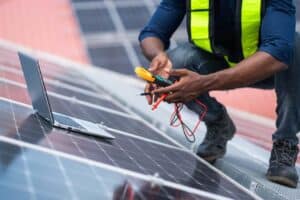In his Human Rights Day address, President Cyril Ramaphosa urged South Africans to cut government some slack with load shedding.

In his Human Rights Day address, President Cyril Ramaphosa said that load shedding critics should cut government some slack because under apartheid a lot of people were denied electricity.
The president delivered his keynote address at the George Thabe Cricket Pitch in Sharpeville on Thursday, 21 March following a wreath-laying ceremony at the Sharpeville Memorial earlier.
The annual celebrations commemorates the gunning down of 69 anti-apartheid protesters in Sharpeville on 21 March 1960.
READ: WATCH: Ramaphosa calls for calm after 16 people injured in ANC-IFP clash
Human Rights Day commemoration interrupted by power cuts
Ironically, the commemoration programme was plagued by power cuts which interrupted Ramaphosa’s speech twice. This despite Eskom’s announcement of the suspension of load shedding suspension until further notice for Thursday.
Sports, Arts and Culture Minister Zizi Kodwa earlier told the crowd that the generator used at the venue was taking too long to kick in.
In defense of the country’s crippling power outages, Ramaphosa said:
“Load shedding was permanent under the apartheid government. As we are dealing with load shedding, we know it will be solved. It will come to the end because we got a clear intention to do so.”
He said that nine out 10 households in the country have clean water and electricity while eight out of 10 have adequate houses.
ALSO READ: Eskom grants South Africans load shedding reprieve ahead of Human Rights Day
Public backlash over load shedding
The government continues to receive huge public backlash for load shedding.
Since 2007, it had been implementing deliberate power cuts to save the national energy grid from total collapse.
Ramaphosa also claimed there were fewer woman dying during child birth and that the infant mortality rate had dropped sharply under the democratic era compared to the past.
This year’s Human Rights Day celebrations took place as the country is gearing up to go to the polls on 29 May – 30 years since the nation voted for the first time under the democratic era.
Right to vote: 30 years since majority voted for the first time
The 2024 elections are considered the most important since 1994’s historic elections.
Ramaphosa said the elections – which are held every five years in South Africa – can be counted among the achievements of freedom struggle and that they reflect the will of the people.
Ramaphosa lauded South Africa for hosting peaceful, free and fair elections.
“As we celebrate 30 years of freedom, we will reflect on the progress we have made. We do have much to celebrate. This new South Africa has changed for the better compared to the one pre-1994,” said Ramaphosa.
READ: Eskom ramps up load shedding for the week – Here’s your schedule
Human Rights Day praise for freedom fighters
Counting the achievements of his government, the president further said many people who had been relegated to poverty by the apartheid regime, have been lifted out of poverty by the democratic government.
He said the struggles and sacrifices of the past freedom fighters, brought about the achievements enjoyed today.
Ramaphosa said although many decades have past wince the Sharpeville Massacre, the government still remembers with sorrow the 69 protesters who were killed for fighting for their human rights.
The president said the government recalled how the black majority were denied the right to live where they wanted to.
Racism remains major human right violation
In his message of support at the event, SA Human Rights Commission (SAHRC) chairperson Andrew Nissen revealed that racism remains the most reported human rights violation the commission deals with in South Africa.
“We deal with this a lot in our investigations and this work earns us both love and hate. We are being taken to court by people who fail to adhere to human rights. The court recently ruled against us on a case of a farmer who is failing to provide his people with water but we are taking this to the Supreme Courts of Appeals.”
He also added that the commission has opened a criminal case against an Eastern Cape municipal manager for failing to ensure the provision of service delivery to their town.
He concluded by appealing to Ramaphosa – whom he described as a chief defender of human rights – to respect Chapter 9 institutions.
Support Local Journalism
Add The Citizen as a Preferred Source on Google and follow us on Google News to see more of our trusted reporting in Google News and Top Stories.








